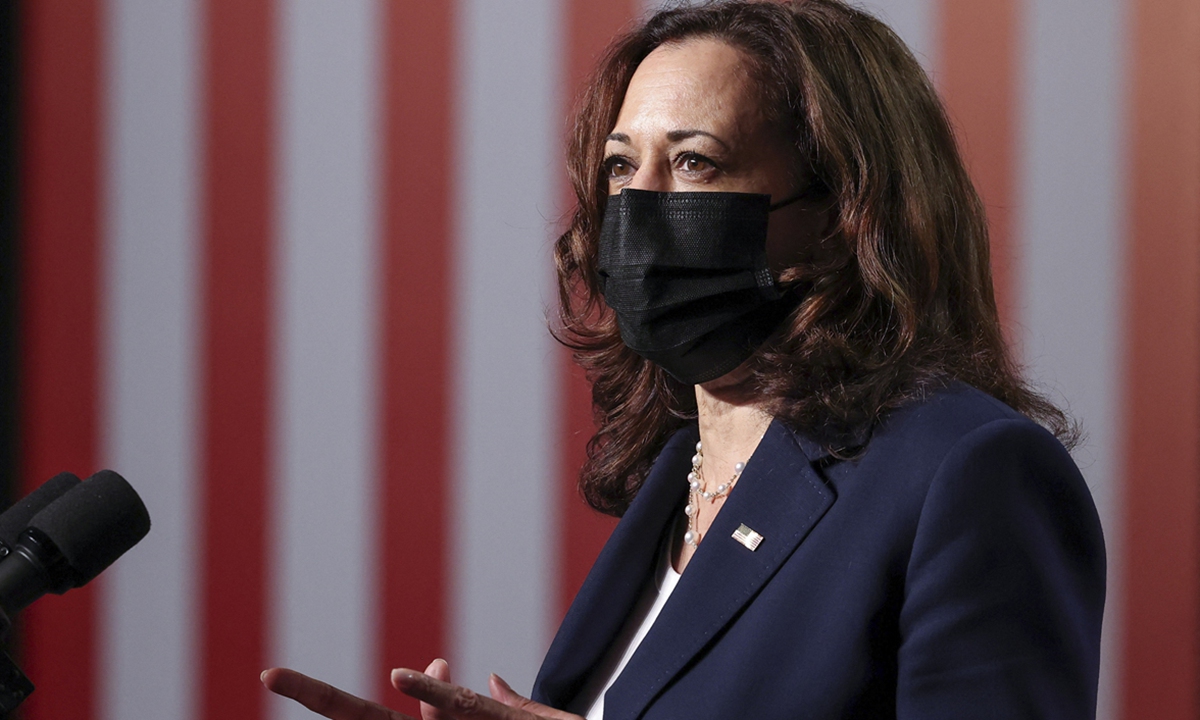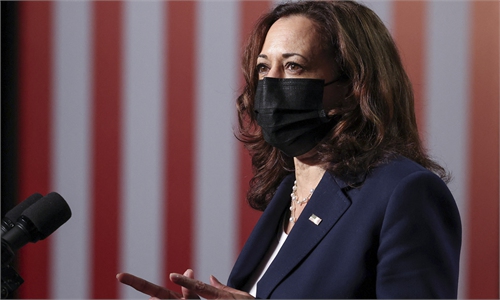Harris' Philippine visit aims at ‘fanning flames,’ and it is unkind: Global Times editorial

US Vice President Kamala Harris. Photo:AFP
US Vice President Kamala Harris is visiting the Philippines, and one of the itineraries has been made an issue of by American public opinion. She plans to go to Palawan on Tuesday, an island province which is close to China's Nansha Islands and is called by the US media "the frontline of the Philippines' territorial dispute with Beijing over the South China Sea." The trip will make Harris the highest-ranking US official ever to visit the Philippine island. She will also meet the members of the Philippine Coast Guard there.However, the goal of Harris' trip is obviously not limited to strengthening bilateral relations between the US and the Philippines. Her focus is more on fanning the flames of the South China Sea issue. Even the US media admitted that Harris' visit of the Palawan Province as vice president would be "highly symbolic" and "convey US messages to China." Some US analysts said the move may "annoy" China, or "cause moderate frustration in Beijing" and so on. Indeed, there may be Americans who want to see such an effect, but they don't understand China at all. If you really want to ask us what we think of Harris' visit, the answer is: The trip will further increase the impression that the US often says one thing but does another and enhance China's determination to strengthen itself. These are our frank words.
Of course, we have no objection to the US engaging with countries in the region. Palawan is territory of the Philippines, and the Philippines has the right to receive any foreign visitor. What we want to emphasize is that any bilateral exchanges should not be at the expense of the interests of any third country as well as regional peace and stability. Philippine President Ferdinand Marcos Jr. has repeatedly stated that his country's relations with China should not be defined by maritime issues. Against this backdrop, Harris' visit is more like an attempt to forcibly put the fuse of conflict in the South China Sea into the hands of the Philippines. To be honest, this move is not so kind.
The South China Sea issue has always been sensitive for all sides and vulnerable to outside disturbance. Washington has stirred up trouble here in the past years, trying to create a situation in which South China Sea countries unite to confront China. But under the joint efforts of regional countries, the water has remained generally stable, and China's willingness and ability to manage differences with other countries in the region has increased. China-Philippine relationship of comprehensive strategic cooperation has made significant progresses in various fields, and the two sides have reached a strategic consensus to hold friendly consultation and handle differences and disputes properly on issues such as the South China Sea. While attending the 77th session of the UN General Assembly in New York in September, Marcos Jr also said that the Philippines intends to renew talks with China on joint oil and gas exploration in the South China Sea.
However, Washington has made the South China Sea one of its strategic game points against China. Its actions in the region are not aimed at allowing the de-escalation of the situation. Instead, they aim at pushing for an escalation, and encouraging regional countries to take provocative actions against China and stimulating their impulse to get tough on China. The nature of Harris' visit to Palawan falls into this category. If Washington is serious about "avoiding and preventing misunderstandings and misperceptions or fierce competition from veering into confrontation or conflict," as President Biden put it, then such foul plays should be stopped once and for all.
Many observers believe that after the meeting between the heads of state, a window of opportunity appeared for China-US relations to stabilize. When Harris visited the Philippines, there was news of progress in exchanges between China and the US in important fields such as military, economic and trade, and climate. US trade representative Katherine Tai met with China's Commerce Minister Wang Wentao last Friday, the first time she met with a senior Chinese official since assuming office. According to Xie Zhenhua, China's special envoy for climate change, China and the US had constructive talks on climate. US defense secretary Lloyd Austin also repeatedly released information, hoping to conduct high-level dialogue with Chinese military to manage and control the crisis.
China and the US are resuming high-level dialogues in various fields and we also look forward to substantial progress in stabilizing relations between the two militaries. But what's more important is that the US needs to take credible actions and truly implement the "Five Nos" of President Biden, to promote bilateral ties stabilizing and advancing. If Washington continues to contain and suppress China in the name of "competition," while also trying to use "managing competition" to pressure China to "swallow the suffering," it's simply impossible.
Regarding the complexity of China-US relations, not only China and the US, the countries in the Asia-Pacific and the even the entire world need to have a full understanding and corresponding policy arrangement. Target countries that have been "selected" by the US must keep sober to avoid falling into traps.

